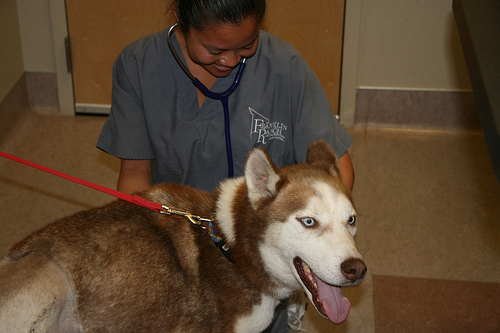The Trouble With Diseases Like IMHA – And the Great Unknown
Despite all the research and the advances in human and veterinary medicine, sometimes the hardest words to hear are “We just don’t know.”

“It’s a 50/50 shot.”
“Anywhere from 70 to 30%.”
“Odds are, we just don’t know.”
These are words you might expect to hear at a racetrack, but you don’t want to hear them from your veterinarian. And I hate saying them. Trouble is, with all the knowledge we have in veterinary medicine, there are still some stinky diseases out there where the outcome is like a crap shoot. Odds are…we just don’t know.
It feels lousy having to tell a client that her pet has a disease, and that the prognosis is impossible to predict.
Clients have very troublesome reactions:
- “What do you mean you don’t know if she’ll respond or not? Don’t you know what medicine to use?”
- “You mean even if it costs me an arm and a leg, she still might not make it?”
- “When to stop treatment? How could you say that? I’ll do anything to save my dog.”

Don’t leave your pet’s safety to chance
Sign up for Petful recall alerts today.

A Bad Disease
The disease I resent the most when it comes to the great unknown is immune-mediated hemolytic anemia (IMHA), also known as AIHA (autoimmune hemolytic anemia). This diagnosis warrants a difficult conversation between me and a pet parent.
Here’s why:
- The outcome for my patient is unknown, despite the best treatment that money and veterinary medicine can provide.
- Treatment may be very expensive, often requiring referral to a specialty hospital.
- My patient may linger for a long time on a seesaw of improvement and relapse.
- If my patient pulls through the crisis, lifelong monitoring/medications/side effects are probable.
A typical case of IMHA goes something like this: Mrs. Goodperson brings in her sweet tempered Molly, a 5-year-old Cocker Spaniel that has just been a little “off” as of late. The dog has been lethargic for 2 days, and Mrs. G is concerned. Molly has otherwise been a healthy dog.
Miss Molly appears tired on the exam table but is still wagging her tail. She does not appear critically ill. Her temperature is slightly elevated. Mrs. G tells me she’s eating a little at home. Then I peek inside her mouth. Her gums are white. My heart sinks. Her pale gums, which should be a healthy pink, indicate that she is extremely anemic.
Why would Molly, who lives life as a fluff muffin on a couch, lose a lot of blood and become acutely anemic?
In the video below, Greg Martinez, DVM, explains more about anemia and blood transfusions:

The top reasons for anemia in dogs are:
- Loss of blood from trauma, such as being hit by a car
- Bleeding internally, such as from a tumor that has begun to bleed
- Autoimmune anemia, where the red blood cells within the body are being destroyed
I take a quick listen and feel Molly’s abdomen. Internal bleeding is possible but unlikely from my initial exam. Mrs. Goodperson has already told me that Molly has been home safe and sound. No history of trauma. I worry that Molly is suffering from IMHA.
There is no simple blood test to diagnose IMHA, but a few quick tests and X-rays point me in the direction of a fairly certain diagnosis.
Why Causes IMHA?
Just as Molly’s outcome is unknown at this point, we also don’t know what caused this dog’s IMHA. Here are some things we do know about why this disease occurs.
- Certain breeds, including the Cocker Spaniel, are predisposed to IMHA.
- Infections, cancer, vaccines or stress of any kind may “trigger” IMHA in predisposed animals.
- Environmental factors, such as toxins or external stresses, may also serve as triggers.
In other words, just about any insult to the body can “trigger” an inappropriate immune response in a certain population of dogs and cats.

In most of my cases of IMHA, we never find a cause. The pet hasn’t been in recently to receive vaccinations or hasn’t been sick. In Molly’s case, one day she was fine, and the next day she seemed down and out. That’s the typical presentation.
So now I come face to face with Mrs. Goodperson and have to tell her that Molly is:
- Gravely ill, even though she may not appear that way on the surface
- Needs 24-hour monitoring and immunosuppressive medication until she is stable
- May need multiple blood transfusions if her anemia becomes critical
- May not survive despite all this aggressive treatment
At this point, Mrs. G is in shock. Only time will give us the answers she so desperately wants. It will be a waiting game of emotional ups and downs. Thrills when Molly’s anemia improves, and grave disappointment if she crashes again.
To the best of my ability, I lay out a game plan but stress to the pet family that they have to brace themselves for an emotional roller coaster. They can feel overwhelmed, in despair and heartbroken. Recently, a friend of mine brought in her little puffball of a Havanese. With a heavy heart, I diagnosed IMHA.
After 10 days of medications, ICU monitoring and multiple blood transfusions, my little patient had a series of setbacks. Her little body fought all our medicine and destroyed all our blood transfusions. The caretaker made her own decision that enough was enough. This little dog would not be one of the lucky patients who would respond to the first few days of medications and go home with a bounce in her step.
My friend wrote me and my staff a letter after losing her best little friend. She wrote that I had told her from the beginning what might happen, and that she did not feel blindsided when her pup was on a downward slope. Deep sadness and a feeling of helplessness, yes. But unprepared, no.
Despite all the research and the advances in human and veterinary medicine, sometimes the hardest words to hear are “We just don’t know.” Acceptance gives some relief to our grief, but it’s not an easy pill to swallow.







